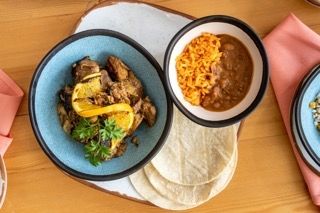Pair your meal with a perfectly mixed hand crafted margarita for a perfect experience
Is Mexican Food Healthy And Balanced? Unloading the Nutritional Perks of Traditional Components
The question of whether Mexican food is healthy welcomes an expedition of its conventional active ingredients. Beans and corn offer as fundamental staples, rich in protein and fiber. Avocados offer useful fats, while numerous herbs and seasonings include taste and health advantages - lunch and dinner. Together, these elements create a tapestry of nourishment. The healthiness of Mexican food usually depends on prep work techniques and part dimensions. What duty do these factors play in determining its overall dietary value?
The Power of Beans: Healthy Protein and Fiber-Rich Staples
Frequently overlooked, beans serve as a keystone of Mexican cuisine, supplying a riches of dietary benefits. Rich in healthy protein, they are an excellent plant-based option for those seeking to fulfill their nutritional healthy protein requires. This high healthy protein material supports muscle mass repair and growth, making beans important for both vegetarians and meat-eaters alike. Furthermore, beans are a phenomenal source of nutritional fiber, which assists in digestion and promotes a feeling of volume, potentially aiding with weight monitoring.
The selection of beans utilized in Mexican meals, such as black beans, pinto beans, and kidney beans, adds to a diverse flavor profile and can enhance dishes nutritionally. Beans are reduced in fat and consist of vital vitamins and minerals, including iron, folate, and magnesium. With each other, these characteristics make beans an important active ingredient, delivering both nourishment and food in traditional Mexican fare.

Corn: a Versatile Grain With Nutritional Perks
Corn attracts attention as a flexible grain fundamental to Mexican cuisine, commemorated not just for its culinary applications but additionally for its impressive nutritional account. As a primary active ingredient in meals like tortillas, tamales, and pozole, corn provides crucial nutrients that add to a well balanced diet plan. Rich in carbohydrates, it offers as a substantial power resource, while additionally being low in fat, making it a desirable option for numerous dietary needs.
Corn is a great resource of dietary fiber, which aids in food digestion and advertises satiety. It includes significant quantities of vitamins such as B-complex vitamins, which are crucial for basal metabolism. The presence of anti-oxidants, especially carotenoids, adds to overall health and wellness by minimizing oxidative stress and anxiety. In addition, corn is gluten-free, accommodating those with gluten sensitivities. Generally, the dietary benefits of corn highlight its importance in conventional Mexican food and its function in a healthy diet.
Avocados: Healthy Fats and Nutrients in Every Bite
Avocados play a significant role in Mexican cuisine, complementing dishes with their creamy appearance and abundant taste. Beyond their cooking allure, avocados are celebrated for their excellent nutritional account. They are an abundant source of healthy and balanced monounsaturated fats, which can aid lower negative cholesterol degrees and support heart health. Furthermore, avocados are packed with necessary nutrients, consisting of potassium, vitamin E, and B vitamins, adding to overall wellness.
The high fiber material in avocados aids digestion and advertises satiation, making them a helpful addition to any meal. Their distinct nutrient structure can likewise sustain skin health and wellness and give anti-inflammatory advantages. Incorporating avocados right into traditional Mexican dishes or appreciating them as a standalone treat can improve both taste and nourishment, showing why they are a beloved staple in Mexican cuisine. Overall, avocados provide a delicious means to take pleasure in healthy and balanced fats and critical nutrients in every bite.

Spices and Herbs: Flavorful Health And Wellness Boosters
While enjoying the rich flavors of Mexican cuisine, one can not forget the crucial function that spices and natural herbs play in enhancing both taste and wellness. Active ingredients such as chili, oregano, and cilantro peppers not only add to the dynamic flavor account however also give significant health and wellness advantages. As an example, cilantro is understood for its purifying buildings, assisting to get rid of heavy metals from the body, while oregano is packed with anti-oxidants and possesses anti-inflammatory impacts.
Chili peppers, a staple in many Mexican meals, consist of capsaicin, which has actually been linked to enhanced metabolic rate and discomfort alleviation. Additionally, seasonings like cumin and coriander support digestion and might aid visit this web-site in blood sugar regulation. Incorporating these savory wellness boosters into dishes not only enhances the culinary experience but additionally promotes overall well-being, making Mexican food not just delicious, however additionally nutritionally useful.
Traditional Cooking Methods: Enhancing Nutrition and Flavor
Traditional cooking techniques in Mexican cuisine play an essential duty in enhancing both nourishment and flavor, as additional hints they usually focus on fresh ingredients and classic methods. Strategies such as nixtamalization, where corn is saturated and cooked in an alkaline service, not just enhance the nutrient profile of tortillas however also improve their digestibility - freshly made guacamole. In addition, making use of sluggish food preparation methods, like cooking or braising, allows flavors to combine wonderfully while preserving the stability of the active ingredients

Regularly Asked Inquiries
Are Mexican Food Portions Usually Larger Than Other Foods?
Mexican food portions are frequently bigger than those of many various other cuisines. This particular mirrors conventional eating practices, stressing communal sharing and hearty dishes, which can lead to a more substantial serving size in general.
Exactly how Does the Prep Work Approach Affect Healthfulness of Mexican Food?
Preparation techniques greatly influence the healthfulness of Mexican food. Strategies such as barbecuing or steaming maintain nutrients, while frying can raise undesirable fat content. Options of ingredients and cooking designs ultimately establish total nutritional worth.
Can Mexican Food Be Tailored for Particular Dietary Limitations?
Mexican food can indeed be customized for specific nutritional restrictions. Alternatives, such as using corn tortillas for gluten-free diets or incorporating even more vegetables, enable individuals to delight in conventional tastes while suiting numerous dietary needs.
What Are Usual False Impressions Regarding Mexican Food and Health And Wellness?
Usual mistaken beliefs concerning Mexican food consist of the idea that it is naturally harmful, extremely spicy, and entirely concentrated on fats. In truth, standard recipes typically include healthy components and Related Site can be customized to numerous nutritional requirements.
Exist Much Healthier Alternatives at Mexican Dining Establishments?
Healthier options at Mexican restaurants usually consist of barbequed meats, beans, and fresh veggies. Selecting recipes that stress entire active ingredients and avoiding heavy sauces can cause a more nourishing eating experience, advertising overall wellness.
The variety of beans utilized in Mexican recipes, such as black beans, pinto beans, and kidney beans, contributes to a varied flavor profile and can improve dishes nutritionally. Avocados play a considerable role in Mexican food, complementing meals with their velvety appearance and rich flavor. Incorporating avocados right into traditional Mexican dishes or appreciating them as a standalone treat can enhance both flavor and nutrition, showing why they are a cherished staple in Mexican cuisine. While appreciating the rich flavors of Mexican food, one can not neglect the essential role that spices and natural herbs play in improving both preference and health. Typical cooking techniques in Mexican cuisine play a crucial role in enhancing both nutrition and taste, as they often prioritize time-honored methods and fresh ingredients.